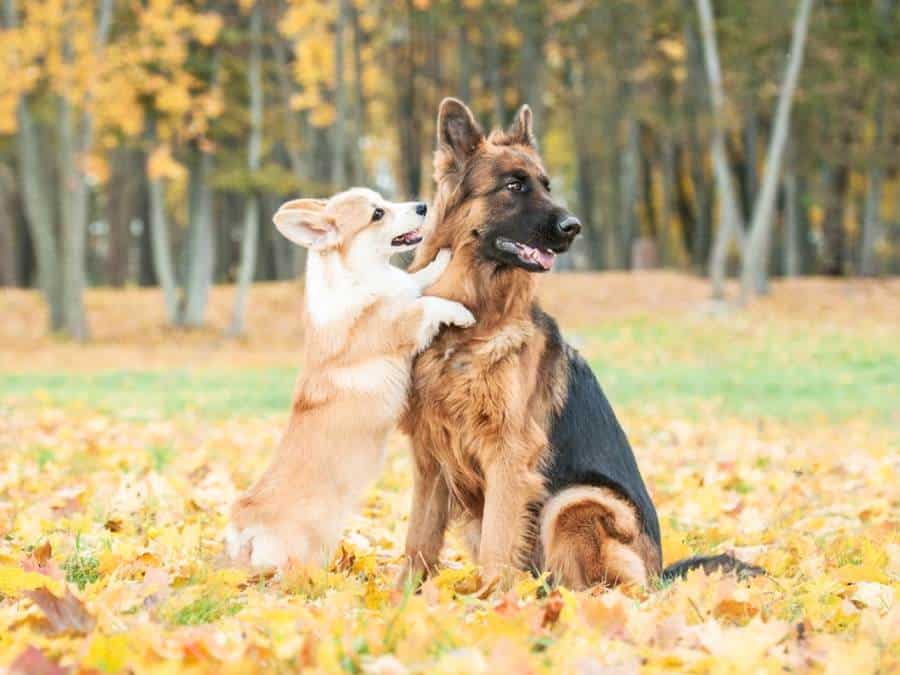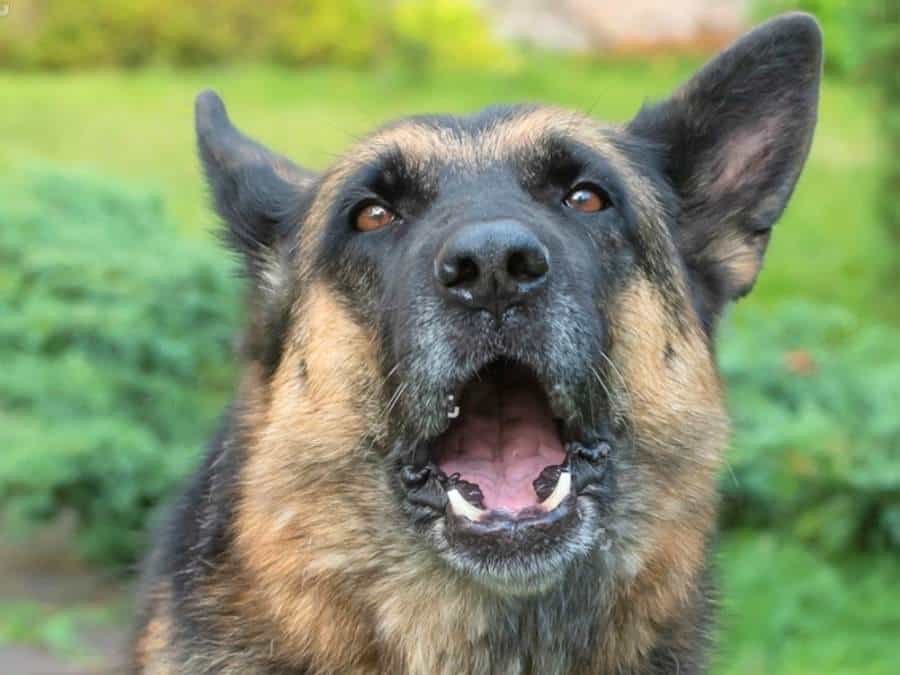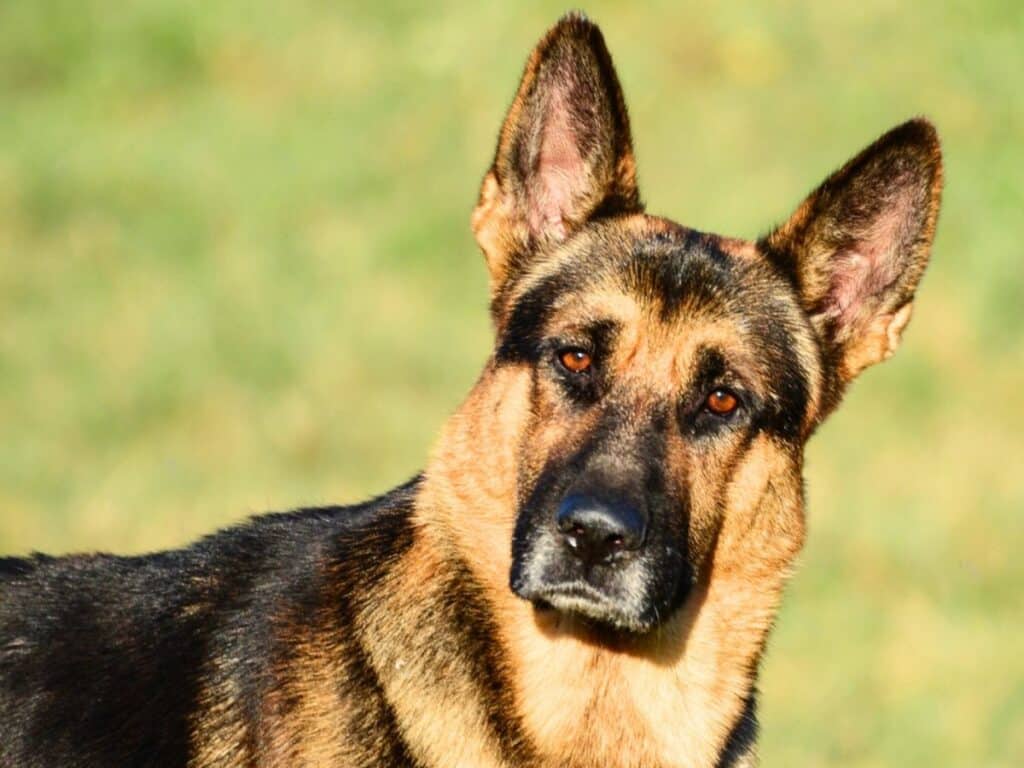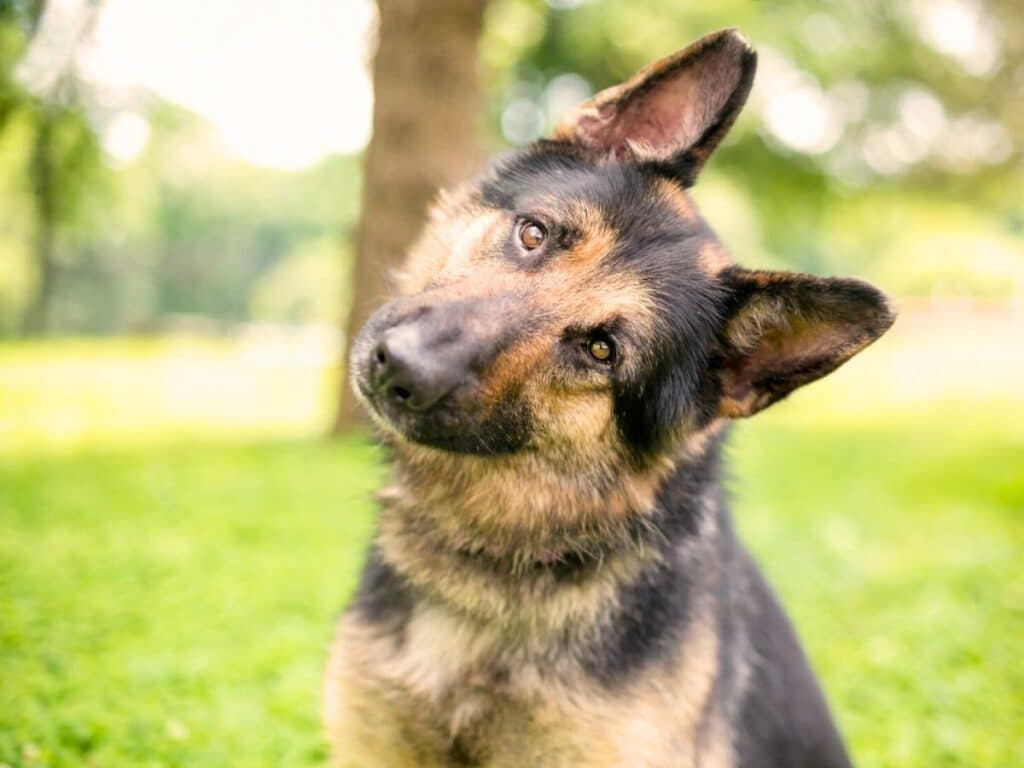German Shepherds, often admired for their loyalty and protective nature, form an unbreakable bond with their human families. However, a common question among potential owners and dog lovers alike is, “Are German Shepherds good with other dogs?”
Well, despite their strong inclination towards safeguarding their loved ones, German Shepherds can surprise you with their ability to develop positive relationships with other dogs when properly socialized.
In this guide, we’ll delve into the breed’s characteristics, the importance of socialization, and the factors that influence their ability to get along with their canine counterparts.
I have gone through several forums (such as Quora, Reddit, Petforums.co.uk, and Germanshepherds.com ) to analyze and review the experiences of several GSD owners and combined that with my knowledge of raising three of my GSDs before presenting you the facts in this article.
Do German Shepherds Get Along With Other Dogs?
German Shepherds may be reserved or cautious around unfamiliar dogs. This behavior stems from their strong loyalty and inclination to guard their family and territory. However, German Shepherds tend to be more accepting of dogs they have been introduced to at a young age.
Although it’s not unusual for GSDs to be somewhat aloof when encountering other dogs for the first time, most German Shepherds (if properly trained and socialized) are friendly and enjoy playing with other dogs.
When encountering unknown dogs, they might exhibit signs of wariness such as raised hackles, stiff body posture, or vocalizations.
If socialized properly during puppyhood, they are likely to form strong bonds with familiar canine friends and display friendly behavior towards them. (Research)

Here are a few testimonials that I found on GSD forums from other German Shepherd owners with multi-pet homes. These owners have had first-hand experience of introducing their GSDs to other dogs.

Why a German Shepherd May Not Get Along With Other Dogs
German Shepherds are known for their intelligence, loyalty, and protective nature. However, they may not always get along with other dogs. Let’s explore some reasons why this might be the case.
1. Strong Protective Instincts
German Shepherds have a strong instinct to protect their family and territory. While this makes them excellent guard dogs, it can also lead to overprotective behavior and aggression towards other dogs. (Study)
2. Dominant Personality
German Shepherds are natural leaders with an assertive and confident personality. This can make them easy to train, but it can also cause them to challenge the authority of other dogs, leading to conflicts.

3. Lack of Socialization
If a German Shepherd hasn’t been properly socialized with other dogs from a young age, they may have difficulty adapting to new doggy friends. They may be cautious around unfamiliar dogs and prefer human companionship instead.
4. High Prey Drive
German Shepherds have a strong prey drive, which makes them excellent working dogs. However, this can also cause them to view smaller dogs as prey and exhibit possessiveness over toys or food.
5. Individual Personality
Just like humans, each dog has its own unique character traits which affect how they respond to different situations including encounters with other canines.
Some German Shepherds may inherently possess a calm and easy-going nature which makes them compatible and amicable towards most other dogs regardless of prior experiences or genetic factors.
6. Past Negative Experiences
If a German Shepherd has experienced aggression, intimidation, or attacks from other dogs in the past, it may develop fear, anxiety, or defensive behaviors.
These negative experiences can manifest in various ways, such as increased reactivity, fear-based aggression, or avoidance of other dogs. These signs can include excessive barking, growling, raised hackles, avoidance, or submissive posturing.
It’s important to note that not all German Shepherds will have issues getting along with other dogs. Proper training, socialization, and early exposure to different environments can help mitigate these potential challenges.
Here are a few more testimonials from GSD owners about their experience with having a GSD along with other dogs at home.

RELATED:

How To Help Your GSD Get Along With Other Dogs
If you want your German Shepherd to get along with other dogs, there are several things you can do to help facilitate positive interactions. Here are some tips to consider:
Socialization is the key
- Start early: Introduce your GSD to other dogs and puppies from a young age. This will help them develop positive social skills and reduce the chances of fear or aggression towards other dogs later in life.
- Gradual exposure: Begin by introducing your GSD to well-behaved, friendly dogs in controlled environments. Slowly increase the level of difficulty by exposing them to different sizes, breeds, and energy levels of dogs.
- Take your German Shepherd to dog parks: Dog parks are a great way for your German Shepherd to socialize with other dogs in a safe and controlled environment.
Training and Obedience
- Basic commands: Teach your GSD basic obedience commands such as “sit,” “stay,” and “leave it.” These commands will help you maintain control in potentially challenging situations with other dogs.
- Focus exercises: Practice focus exercises with your GSD to redirect their attention from other dogs. Use treats or toys to reward them for maintaining eye contact with you, even when distractions are present.
- Leash manners: Train your GSD to walk calmly on a leash, without pulling or lunging towards other dogs. This will make walks more enjoyable for both you and your dog.
Proper Introductions
- Neutral territory: When introducing your GSD to a new dog, choose a neutral location such as a park or a friend’s backyard. This can help prevent territorial behavior.
- Controlled environment: Use a leash and ensure both dogs are under control during the initial introduction. Allow them to sniff each other while keeping a close eye on their body language.
- Playdates: Organize playdates with well-mannered dogs that your GSD gets along with. Supervise the playtime to ensure it remains positive and doesn’t escalate into rough play or aggression.
Remember, every dog is unique, and it may take time for your GSD to feel comfortable around other dogs. Be patient, and consistent, and always prioritize safety. If you have concerns about your GSD’s behavior, consider seeking guidance from a professional dog trainer or behaviorist.
You can also refer to my article How do I introduce my German Shepherd to my other dog?

Do German Shepherds Get Along With Small Dogs?
German Shepherds may not be the best match for small dogs because of their size and strength. Small dogs have delicate bodies and bones, making them susceptible to injuries during rough play or accidental falls from elevated surfaces.
Additionally, German Shepherds have a strong prey drive, which can be triggered by small dogs. However, with proper socialization, most German Shepherds can get along well with smaller dogs.
Calmer and more obedient Shepherds are less likely to harm smaller dogs, but caution should still be exercised when introducing them.
It is important to supervise their interactions and ensure that both dogs feel comfortable and safe. Positive reinforcement training techniques can be used to encourage good behavior and create a positive association between the two dogs.
Here’s what other owners have to say about having a German Shepherd along with other small dogs at home.


What Dogs Do German Shepherds Not Get Along With?
German Shepherds are generally friendly and sociable dogs, but like any breed, there are certain types of dogs that they may not get along with.
- Aggressive or dominant dogs: German Shepherds are known for their strong protective instincts, so they may not get along well with dogs that display aggressive or dominant behavior. This can lead to conflicts and potential fights between the two dogs.
- Small or fragile dogs: German Shepherds are large and powerful dogs, so they may not be the best match for small or fragile dog breeds. Their size and energy levels can be overwhelming for smaller dogs, and accidents or injuries may occur unintentionally.
- Unsocialized or poorly trained dogs: German Shepherds are intelligent and well-behaved when properly trained and socialized. They may have difficulty getting along with dogs that have not been socialized or have poor manners.
- Prey-driven dogs: German Shepherds have a strong prey drive. Dogs with a similar prey drive may not be the best match for a German Shepherd, as their instincts could lead to aggressive behavior towards each other.
- Overly submissive or fearful dogs: German Shepherds tend to be confident and assertive dogs. They may not get along well with dogs that are overly submissive or fearful, as this can create an imbalance in the dynamics between the two dogs.
- Territorial Dogs: German Shepherds can be territorial, and conflicts may arise when introducing them to other territorial dogs. Establishing neutral territory for introductions can help reduce potential issues.
What Dog Breeds Get Along Best With German Shepherds?
When it comes to finding a compatible companion for a German Shepherd, it is important to consider a few factors such as temperament, energy level, and size.

While there are no guarantees, some dog breeds are known to generally get along well with German Shepherds due to shared characteristics or temperamental similarities.
- Labrador Retriever: Labradors are known for their friendly and easygoing nature. They are often sociable and adaptable, making them potentially good companions for German Shepherds.
- Golden Retriever: Like Labradors, Golden Retrievers are known for their friendly disposition. They are typically gentle, intelligent, and social, making them potential friends for German Shepherds.
- Collie: Collies are herding dogs, like German Shepherds, and they often share a similar work ethic and intelligence. They can get along well if properly introduced and socialized.
- Boxer: Boxers are known for their playful and energetic nature. They can match the energy level of German Shepherds and engage in active play.
- Siberian Husky: If both breeds are well-socialized and trained, German Shepherds and Siberian Huskies can get along. Both breeds are intelligent and active, enjoying physical and mental stimulation.
- Poodle: Poodles are often sociable and intelligent. Their various sizes (standard, miniature, and toy) can make them adaptable to different energy levels.
- Border Collie: Border Collies share similarities with German Shepherds in terms of intelligence and herding instincts. With proper introductions, they can make good companions.
- Shetland Sheepdog: Shelties are often known for their friendly and gentle nature. They are smaller in size but can get along well with German Shepherds.
RELATED:
What To Do If Your GSD Does Not Get Along With Other Dogs?
If your German Shepherd does not get along with other dogs, there are several steps you can take to address the issue and improve their socialization skills.

1. Identify the trigger
Observe your German Shepherd’s behavior around other dogs to determine what triggers their aggression or discomfort.
It could be a certain size or breed of dog, specific behaviors, or even certain environments. Understanding the trigger can help you develop a targeted approach to address the issue.
2. Gradual exposure
Start by gradually exposing your German Shepherd to other dogs in controlled environments. Begin with calm and well-behaved dogs and gradually increase the level of interaction over time.
Use positive reinforcement techniques, such as treats and praise, to reward your dog for calm behavior.
3. Consult a Professional
If your German Shepherd’s aggression or discomfort around other dogs persists, consider seeking professional help from a dog trainer or behaviorist.
They can provide guidance and develop a tailored training plan to address your dog’s specific needs.
4. Desensitization and counter-conditioning
Desensitization involves gradually exposing your German Shepherd to their triggers in a controlled and positive way.
Counter-conditioning involves changing your dog’s emotional response to the trigger by associating it with something positive, such as treats or playtime.
These techniques can help your dog become more comfortable and less reactive around other dogs.
5. Avoid Confrontations
Until the behavior improves, avoid putting your German Shepherd in situations where they might feel threatened or react aggressively.
This might involve keeping them on a leash in public spaces or avoiding off-leash interactions.
Consider spaying or neutering your German Shepherd, as this can sometimes reduce aggressive tendencies.
Remember that behavior modification takes time and patience. Consistency in training and a positive approach are key.

Do Male and Female German Shepherds Get Along?
Male and female German Shepherds can generally get along well with each other. While individual personalities may vary, German Shepherds are known for their intelligence, loyalty, and social nature, which can make them adaptable to living with other dogs of the opposite sex.
However, it is important to introduce them properly and provide proper socialization to ensure a harmonious relationship.
Early socialization, positive reinforcement training, and supervised interactions can help male and female German Shepherds establish a strong bond and live together peacefully.
It is also crucial to consider the individual temperament and energy levels of the dogs involved to ensure compatibility.
Overall, with proper introductions and ongoing training, male and female German Shepherds can form a strong bond and enjoy a harmonious coexistence.
Conclusion
So, are German Shepherds good with other dogs? Well, Yes and no! Remember, early socialization is key to ensuring your German Shepherd becomes a well-adjusted and friendly companion to other dogs. By selecting compatible companions and employing effective training techniques, you can prevent negative encounters and promote positive interactions between your German Shepherd and other dogs.
Frequently Asked Questions
1. Do German Shepherds get along with other German Shepherds?
Generally, German Shepherds can get along well with other dogs of the same breed, especially if they are properly socialized and introduced. However, individual temperament and proper introductions play crucial roles in their compatibility.
2. Why does my German Shepherd not get along with other dogs?
There could be various reasons, including lack of socialization, past negative experiences, or individual temperament. Consulting a professional dog trainer or behaviorist can help identify specific triggers and develop a plan to address the issue.
3. Do female German Shepherds get along with other female German Shepherds?
Female German Shepherds can get along with each other, but compatibility depends on factors like individual temperament, socialization, and proper introductions. Some female dogs may show territorial or dominance behaviors, so careful monitoring and positive reinforcement are essential for harmonious coexistence.
FURTHER READING:




